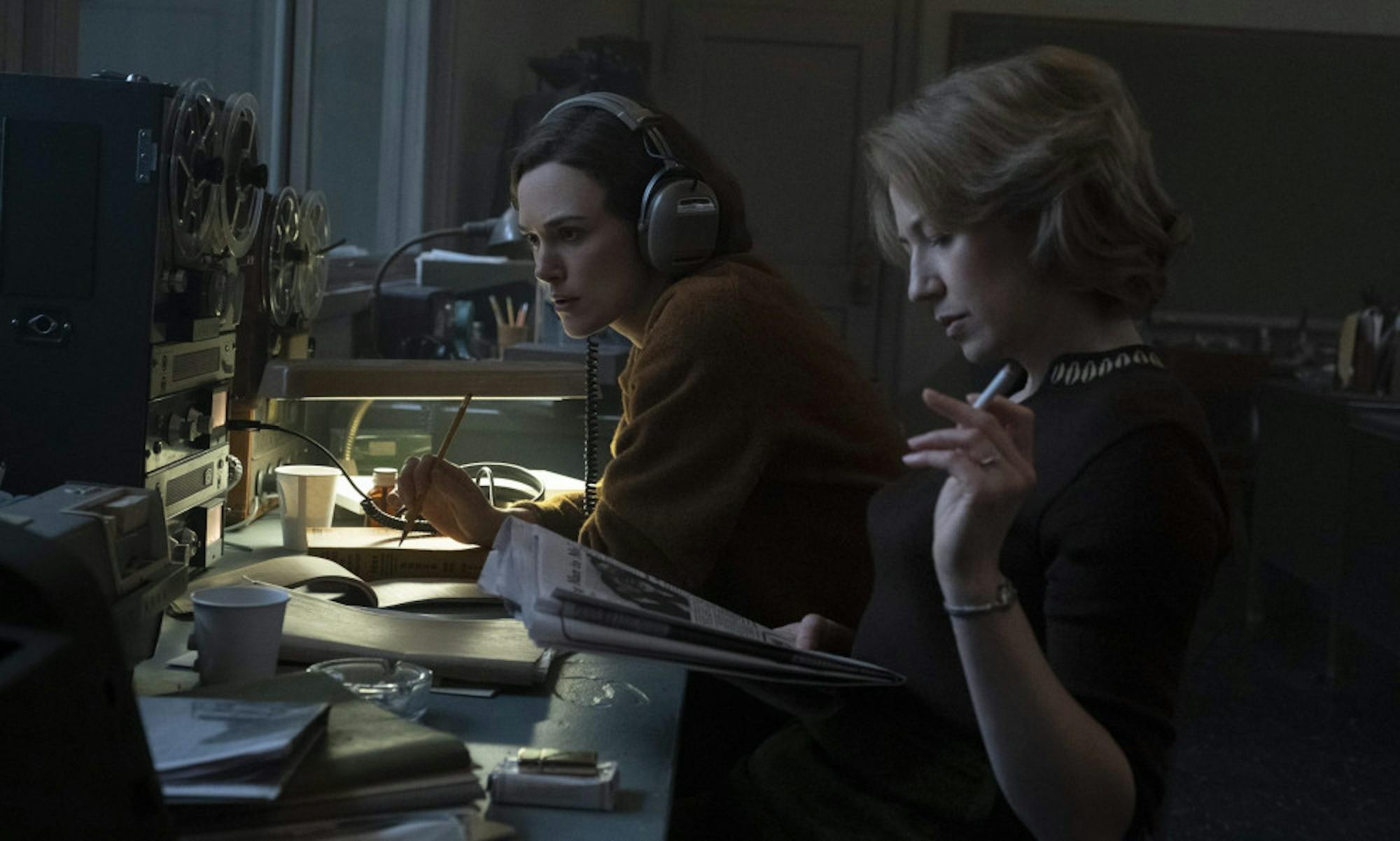“Boston Strangler” (2023) is a true crime story that doesn’t glorify its killer. Rather, it celebrates those who brought him to justice. At a roundtable panel with Matt Ruskin, the film’s writer and director, the Daily learned more about the quality journalism that inspired this film.
A native of Watertown, Mass., Ruskin was already familiar with the Boston Strangler case. While he knew it would translate well on film, he didn’t set out to create a typical true crime, serial killer story. Rather, the film follows the two female journalists responsible for breaking the case, Loretta McLaughlin (Keira Knightley) and Jean Cole (Carrie Coon). Ruskin tracks McLaughlin and Cole as they investigate a series of gruesome murders in 1960s Boston, navigating police incompetence, sexism in the newsroom and the collapse of idealized white America.
Learning about the journalists connected to this case inspired Ruskin.
“I love journalism movies and I really respect and admire good journalism,” Ruskin said. “I thought it would be a great way in to tell the story of this case.”
After finishing his last project, “Crown Heights” (2017), another story inspired by true events, Ruskin fell deeper into the layered mystery of the Strangler case. There was little to go by when researching McLaughlin and Cole. Through the reporters’ obituaries and amateur Facebook sleuthing, he serendipitously discovered that a friend of his was Cole’s granddaughter.
For Ruskin, meeting McLaughlin’s and Cole’s children provided the necessary context for creating the film.
“I was able to talk to them, and really get a sense of who they were as people and who they were as journalists and how they approach their work,” Ruskin said. “That was invaluable for me.”
This authentic approach is further reflected through the on-location shooting in Boston. Ruskin had the benefit of shooting in a city that values its historic charm, further adding to the authentic quality of the film.
“Once you line the streets with the old cars, it really transports you back to a different period,” Ruskin said.
Not only were the city’s historic brownstones and cobblestoned streets put to use, but so was the rich pool of local talent. Surrounded by a vibrant local theater scene, Ruskin was able to cast many Boston-based actors in his film, a choice that grounded the film in its atmosphere and offered an additional layer of authenticity.
“Boston Strangler” now joins the collective of hard-boiled Bostonian detective films. Ruskin discussed some of his own film influences, including “The Friends of Eddie Coyle” (1973) and “The Thomas Crown Affair” (1968).
“[They are] these incredible iconic old films that really captured the feel of Boston,” Ruskin said. “The hope was to try and find a way to bring back that sense of time and place in a way that felt really authentic.”
While Ruskin certainly succeeded in capturing the visual aesthetic, the film’s narrative arc is a bit more fraught. The Strangler case is layered and complex, spanning multiple years from the time of the first murder in 1962 to the killer’s confession in 1964. Ruskin struggled with adapting the story into a feature narrative while also maintaining a commitment to authenticity.
“The goal is to try and move the story forward and really establish who these people are and paint a picture,” Ruskin said. “A lot of it is just trying to distill that, hopefully without oversimplifying.”
Simplify, but don’t oversimplify. The riveting performances of Knightley and Coon do exactly that. They distill the spirit of these women without forfeiting the nuance of their character. McLaughlin wants to be taken seriously in her career but does not want to ignore her husband and children. She wants to pursue the Strangler at all costs but must take her own safety into account. As both journalists face various obstacles in unraveling this story, Ruskin paints a vivid picture of the female struggle in the ’60s.
Many of the themes found in the film are especially pertinent today. From the violence depicted against women to the lack of faith in police and news authorities, “Boston Strangler” is unusually timely. Ruskin deeply values this connection to the modern day.
“With all of the misinformation in the sort of entertainment news on cable, … having journalists and institutions that are committed to the truth is important as ever,” Ruskin said.
A commitment to the truth matters not only to the audiences but also to those involved in the real-life story. Ruskin ensured that the children of McLaughlin and Cole felt respected and heard during the process.
“I’m really happy that they feel good about the film,” Ruskin said.
Compared to other true crime media, this rarity is well appreciated. Too often, true crime films revel in the horror and violence, showing little empathy for the human victims and those involved in the case. Making an entertaining but empathetic film is a challenge many directors have failed at. Ruskin took on this challenge headfirst, making note of its difficulties.
“You feel this incredible obligation to get it right, to be true to the spirit of who these women were, and to still make an entertaining film,” Ruskin said.
In a genre that has become increasingly commodified and twisted, Ruskin celebrates the truth of true crime. He takes a new and refreshing look at a tragedy, choosing to focus on the process of investigation instead of taking advantage of its morbidity. He wants audiences to connect with this spirit of curiosity, hoping they had the same experience as he did when he first fell down the rabbit hole of the Boston Strangler.






